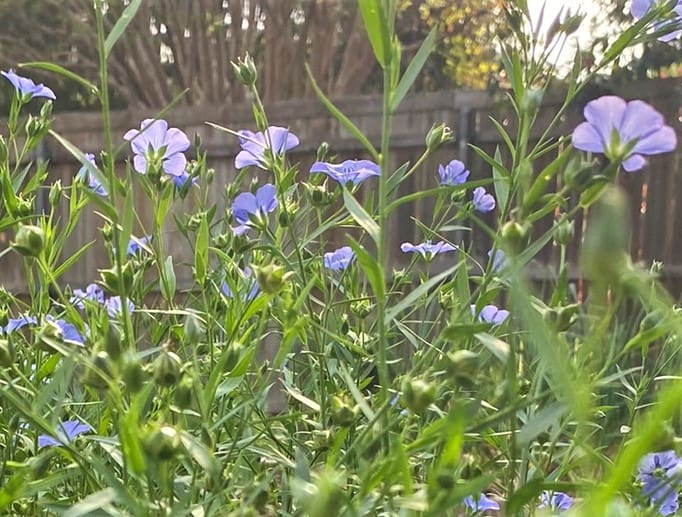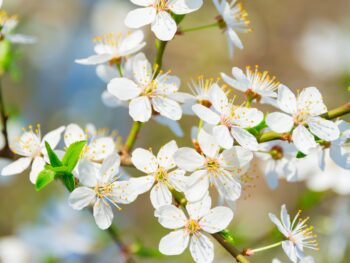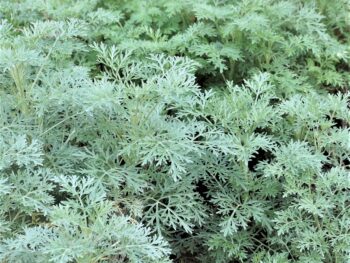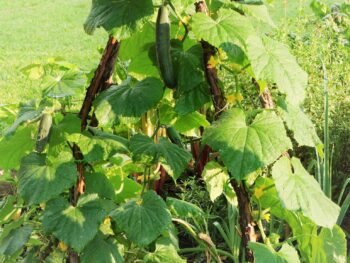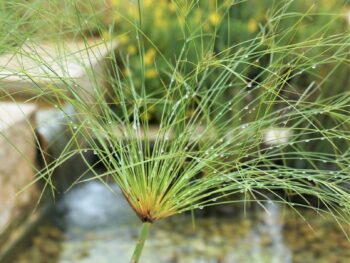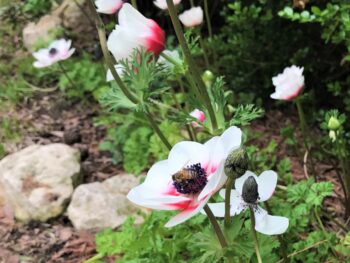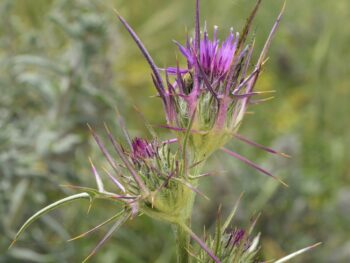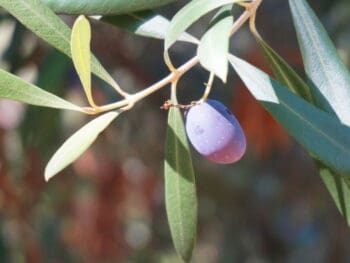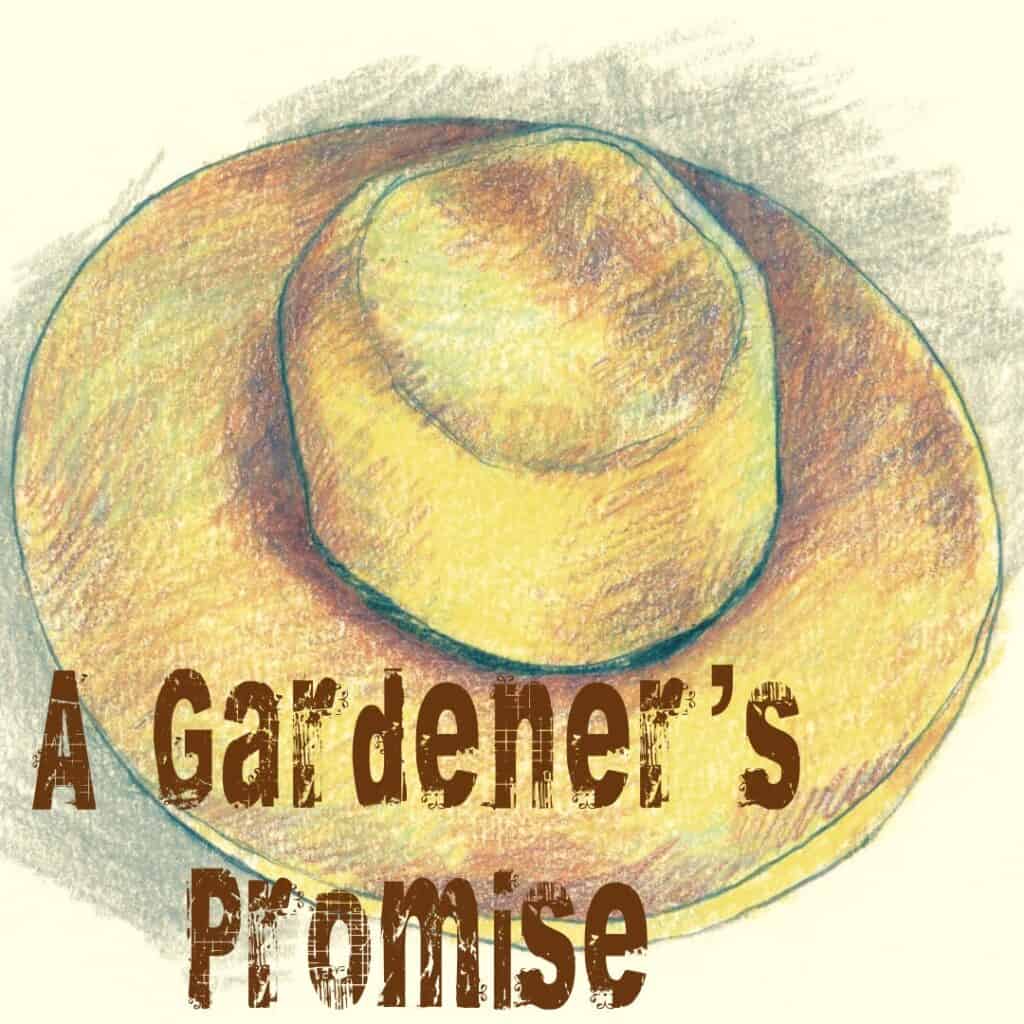
Propagating constantly captivates a gardener because integral with the beauty and bounty experienced in keeping a garden is the intense desire to share these blessings: It can’t be helped! From Instagram photos of every sprouted seed to clumps of iris passed on from Grandma to baskets-full of zucchini left on a neighbor’s back porch, propagating is the part of gardening that promises gardens will go on forever, hallelujah! God, our Father and Gardener, guaranteed this intrinsic brush with eternity when He planted a garden and appointed a garden tomb for Jesus’ death and resurrection (John 19-20). Think about that! Thus, a garden is a gateway to the forever life with the Father, and always has been.
Chapter 13 – Propagating & Flax and Myrtle
My Father is the Gardener digs into these mysteries in chapter 13 and 14, and you will find journal questions below to help make the reading a personal journey. Flax and myrtle will help to usher us through the many facets of propagating, from useful seed to leafy, evergreen elegance, both displaying fanciful flowers for garden joys.
**SPECIAL THIS WEEK**20% off My Father is the Gardener at BRIT Press, use Discount Code RISEN20
Flax and Myrtle
Flax, an annual field crop, and myrtle, an aromatic, evergreen shrub or small tree, are two plants from the Bible that will lend special insight to the pattern of God’s propagating work.
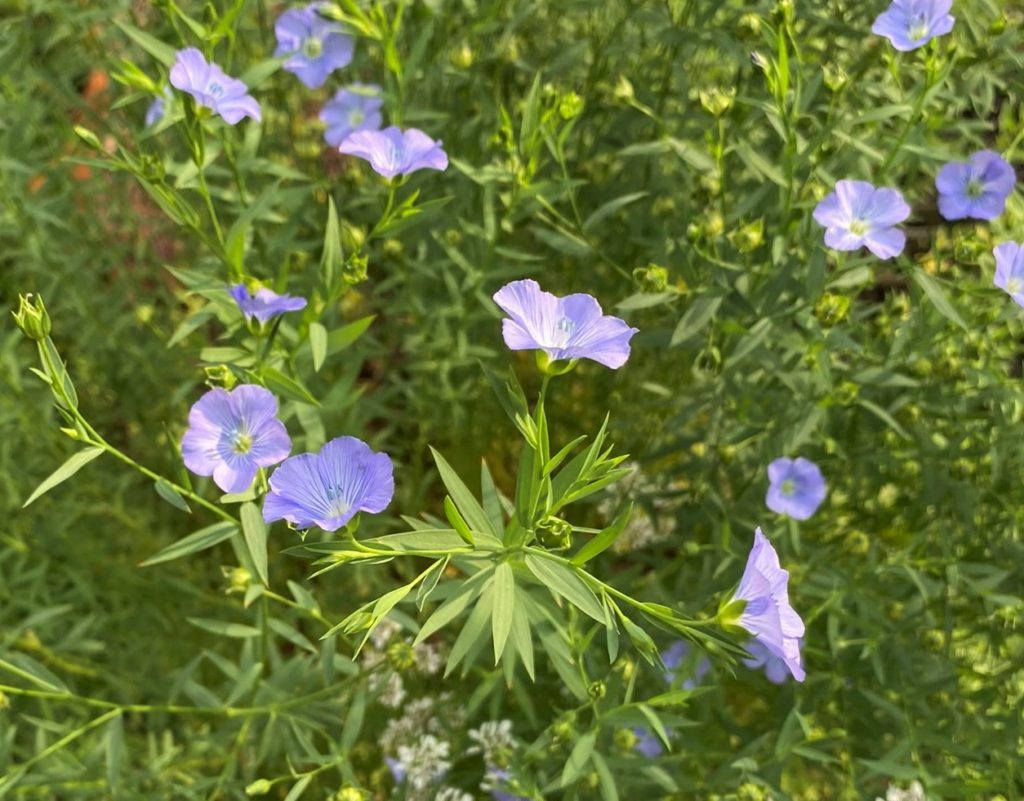
Traditionally, flax is grown in fields to yield commercial amounts of plant stems for linen fiber production. However, flax makes a great garden plant, grown similarly to ornamental grasses, yet delightfully more flowery. Flax’s annual flowers grow best from seed directly sown in the garden in cool soil. Choose a spot out of direct sprinkler spray (drip irrigation is best); once stalks are blooming, they don’t require much water. Seedlings will sprout, grow steadily, and fill the plot with ever-rising, slender stems and diminutive leaves, vivid green and bright in their display. Flax gives a meadow garden feel or fills in nicely (and cheaply) for garden areas yet to be planted. —partly quoted from “Flax Flowers and God’s Redemption,” Devotions Blog, April 2022. Read more for an important Word from Isaiah 19.

Myrtle is a gentle, glossy garden plant, lush with leafy branches, growing as a large shrub, small tree, and even well-trained in topiary. Leaves have the brilliance of holly but none of the prickle, with a more refined form than boxwood. Soft and subtly fragrant, branches remain fresh-looking once cut from the shrub, making them a great choice for bouquets. They endure well as part of the lulav for Feast of Tabernacles celebrations, yet they do not like winter’s chill. In zone 8 and colder, bring myrtle indoors during freezing weather. The bright, sweet-smelling blooms that cover the branches summer to early fall are a precious perk of growing this plant. Berries and leaves will impart their scent in a light, almost rosemary flavor; allow the botanicals to simmer in sauces or glazes and strain before serving. For more information, find Myrtle in the Plant Guide
Click here for a printable PDF file of Propagating and Flax and Myrtle Journal Questions
Chapter 13 Journal Questions
Follow along in chapter 13 of My Father is the Gardener
[Rahab] had taken them up to the roof and hidden them under the stalks of flax she had laid out on the roof. Joshua 2:6 NIV
Linen produced from flax fiber represents the good deeds of God’s people (Revelation 19:8), demonstrating that trust in God is not merely a comforting allegiance, but a vitality-producing relationship that moves us to become engaged and involved.
Shelley S. Cramm, My Father is the Gardener, page 176
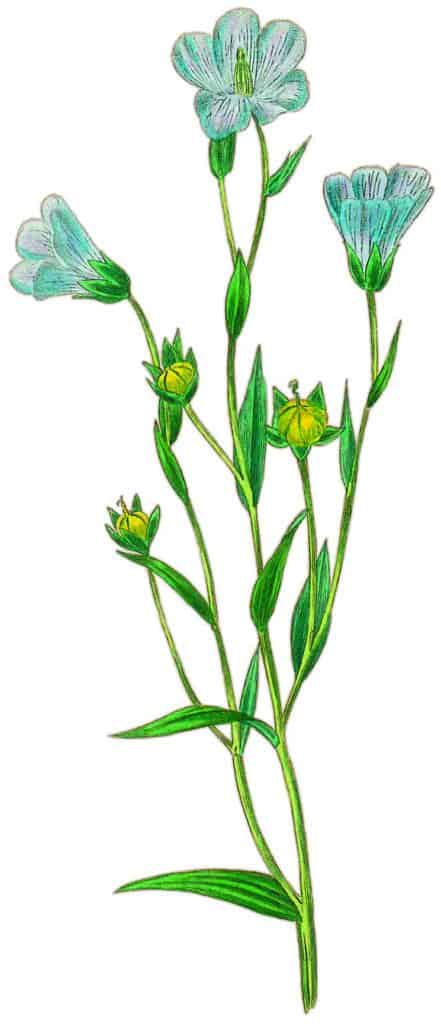
- Have you ever grown flax or are you familiar with the plant?
- Are you fond of linen fabric? Do you like to wear linen clothing or do you use linen napkins?
- Why do you think God wants us to put our faith into activity – into faith-fueled attitudes, deeds, efforts, or projects (James 2:17-18)?
- What are some of the ways you act on your faith? List anything from a simple smile to a stranger to a charity commitment:
- What are other activities that you would like to pursue? Anything that you sense God leading you to do:
- For married women: Active faith begins at home. Settle yourself in God’s love and security. From a sincere heart, ask God to see to it that you bring good to your husband – never evil – every day of your life (Proverbs 31:12):
As it is written, “I have made you the father of many nations.” Abraham acted in faith when he stood in the presence of God, who gives life to the dead and calls into existence things that don’t yet exist. Hoping in spite of hopeless circumstances, he believed that he would become “the father of many nations,” just as he had been told: “This is how many descendants you will have.” Romans 4:17–18 ISV
- “What promise does God set before us that exercises our faith [like Abraham’s]? He sent his Son, Jesus Christ, the Seed of Abraham (Galatians 3:16), to be our righteousness: Believing this truth about Jesus will make us right before God (Romans 4:5, 24–25), aligning us to share in the great faith of Abraham, making us seedlings by faith (Romans 4:16).” Do you believe this truth?
- God’s promise in Genesis 12:3 is a blessing on you; you are like one of those stars Abram [Abraham] saw in the sky! Write a prayer of astounding thanksgiving for God’s faithfulness to you through this promise to him:
The seed will grow well, the vine will yield its fruit, the ground will produce its crops, and the heavens will drop their dew. I will give all these things as an inheritance to the remnant of this people. Zechariah 8:12 NIV
- As you sow seeds in your garden (or greenhouse seed trays), do you tend to just get the work done, or do you stop and take in their “breathtaking reveal of eternity (page 180)?”
- What are we to do in response to revelation of God’s blessing? That is, when we realize how amazingly God has worked on our behalf, orchestrating circumstances to align and save, help, heal, and prosper us, do you see how propagating is an appropriate metaphor for our response?
- Write a praise to God for His way of propagating his blessings:
Now that you have obeyed the truth and have purified your souls to love your brothers sincerely, you must love one another intensely and with a pure heart. For you have been born again, not by a seed that perishes but by one that cannot perish—by the living and everlasting word of God. 1 Peter 1:22–23 ISV
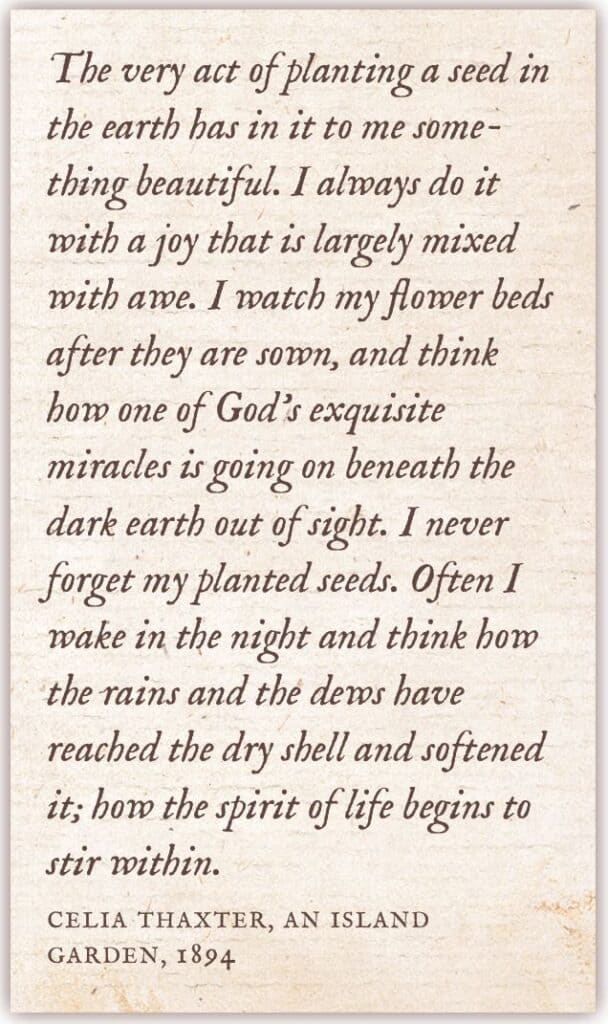
- In your gardening life, what aspect, action, or chore brings you closest to an encounter with “the spirit of life…stir[ring] within,” as Celia Thaxter wrote?
- Do you lie awake at night thinking about your seeds (LOL)?
- Do you connect God’s Word to this “spirit of life” evident in the garden?
- If so, describe the moment this revelation came to you; or when did you realize or understand this relationship between His Word and life?
- If Deuteronomy 32:47 is still a Scripture you do not relate to, write a prayer to God expressing your confusion or asking Him about what you don’t understand:
But Ruth said, “Do not press me to leave you or to turn back from following you! Where you go, I will go; where you lodge, I will lodge; your people shall be my people, and your God my God. Ruth 1:16 NRSV
- Did you come into a relationship with Jesus be being taught by your parents or do you have a “volunteers” faith? That is, did you embrace the Lord on your own, independent of your family life growing up?
- Was it extended family, in-laws or people beyond family bonds who inspired you to turn to the Lord?
- What did you see or what caught your attention and drew you to God?
- Now that you are growing in faith, can you look back at your parents’ lives when you were growing up and see how they may have been “hard pressed (2 Corinthians 4:8)” or “mara (Ruth 1:20)” from difficult circumstances?
- Have you been struck down in life (2 Corinthians 4:9) and found it difficult to share the faith…or share anything good, for that matter?
- Write a praise to God for seeing to it that His love and devotion is propagated, even when we cannot muster strength to put our faith into action:
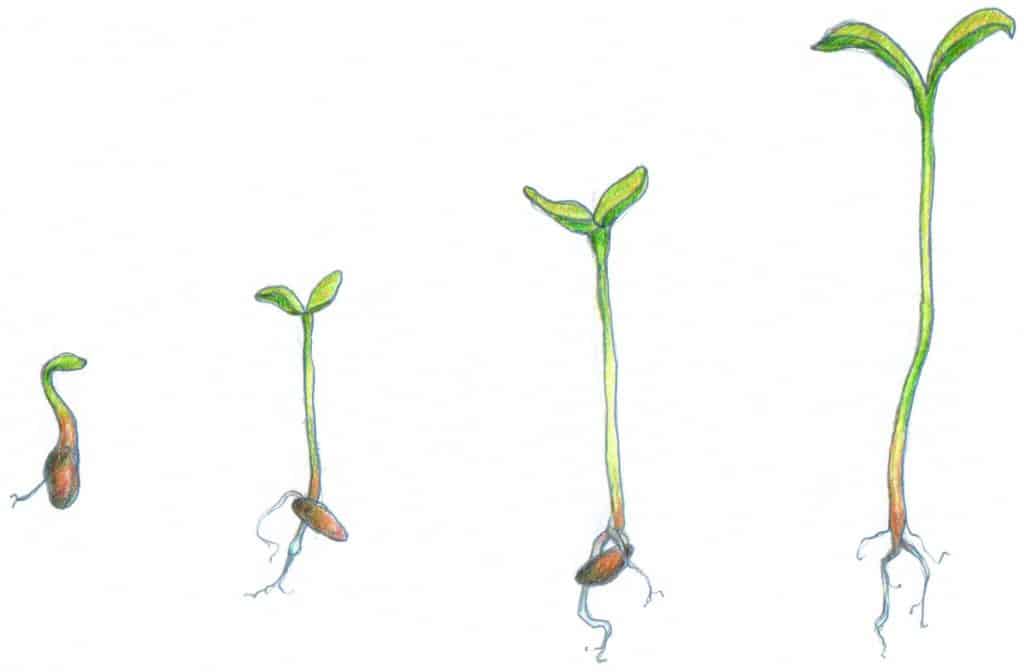
Chapter 14 Journal Questions
Follow along in chapter 14 of My Father is the Gardener
So they issued a proclamation, and it went out to everyone in Jerusalem and in every town that people should go into the hills to gather branches from olive trees, wild olive trees, myrtle trees, palm trees—any kind of leafy tree they could find. With these branches they were told to build temporary shelters to house them during the festival, as God’s law declared. Nehemiah 8:15 VOICE
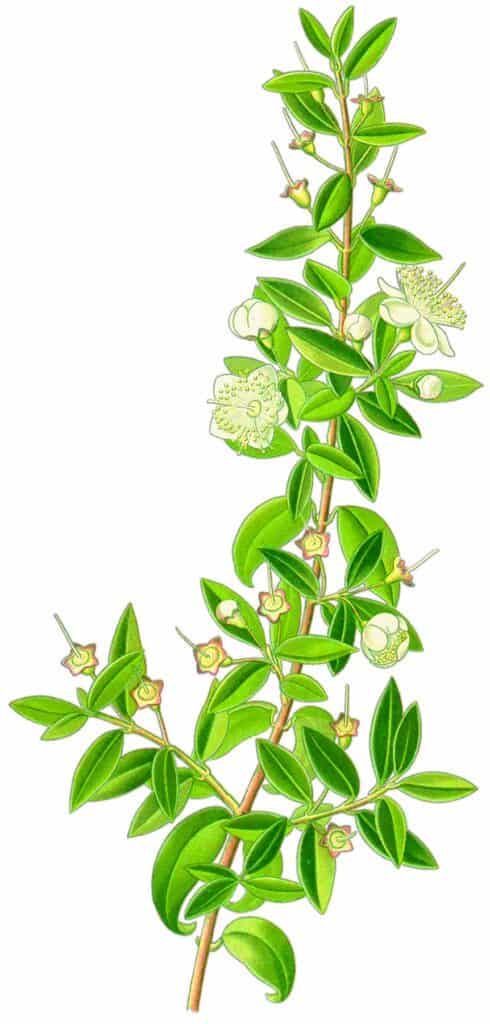
- Are you familiar with the myrtle plant (not to be confused with crepe myrtle or wax myrtle, both popular in the U.S.)?
- If you have never grown myrtle, or live in a climate colder than zone 8, look for its cut branches in floral bouquets, commonly available in the fall.
- How about the Feast of Tabernacles, are you familiar with this fall feast celebrated with tree branches?
- If you were to see a fresh-looking, aromatic, leafy tree thriving in a parched desert, would it attract your eye? Would you think that the hand of the Lord had planted this (Isaiah 41:20)?
- Do you notice a similar in the book of Esther – a radiant, beautiful queen planted, so to speak, in the spiritually parched land of Persia?
- As you read Nehemiah 8:15, Psalm 118:25-27, Isaiah 41:17-20 and Esther 1-9, what do you “see, recognize, perceive, consider, and comprehend (Isaiah 41:18 ISV)” about these parallel passages? Ask the Lord to impress upon your mind His reversal and triumph:
“Not a root or a branch will be left to them. But for you who revere my name, the sun of righteousness will rise with healing in its rays. And you will go out and frolic like well-fed calves…” Malachi 4:1–2 NIV
- Have you propagated plants by cuttings? What plants work best for you by this method?
- Have you witnessed sprouts coming from an old tree stump or a dandelion returning form its root?
- Is it hard to imagine the situation Malachi describes, not a root of branch left to carry on vegetation, signifying the ultimate end of those who do not fear the Lord?
- Read Luke 13:6-9. Write in your own words how this parable resounds the declaration of Malachi 4:1-2:
- Write a prayer for your loved ones who are turned away from the Lord or complacent (Proverbs 1:32); intercede for their place in God’s kingdom to bear fruit in the Lord (John 15:5):
And if the root is holy, so are the branches. Now if some of the branches were broken off, and you, though a wild olive branch, were grafted in among them and have come to share in the rich root of the cultivated olive tree, do not brag that you are better than those branches. But if you do brag—you do not sustain the root, but the root sustains you. Romans 11:16–18 HCSB
- Do you or have you ever propagated a plant by grafting?
- Write a prayer of thanksgiving that by faith in Jesus Christ you have been “grafted” into the sustaining, enduring rootstock of Jewish heritage:
- Do you understand that the Old Testament Scriptures are ready to nourish and quench you?
- Note some of your favorite books of the Old Testament, or favorite passages, psalms, or proverbs:
…The disagreement was so sharp that they parted ways. Barnabas took Mark and sailed to Cyprus, while Paul chose Silas and left after the brothers had entrusted him to the grace of the Lord. Acts 15:39-40 ISV
- What perennials in your garden do you regularly divide? Do you transplant them or give them away to family or gardening friends?
- Has a sharp disagreement ever divided a friendship of yours?
- In your situation, was it hard to part peaceably?
- Often human relationships are not as easy to care for as garden perennials! Reading through these Scriptures gathered on “Dividing,” do you realize how you could have handled your situation differently?
- Ask God for additional insight and direction on what to do next concerning this relationship:
And this, Hezekiah, will be for you the confirming sign: This year you’ll eat the gleanings, next year whatever you can beg, borrow, or steal; But the third year you’ll sow and harvest, plant vineyards and eat grapes. A remnant of the family of Judah yet again will sink down roots and raise up fruit. The remnant will come from Jerusalem, the survivors from Mount Zion. The Zeal of God will make it happen. 2 Kings 19:29–31 The Message
- Do you propagate any of your garden plants by layering?
- Comparing the Scripture story of Hezekiah to the practice of layering gives us a chance to see this history in a new way. Judah was like a branch layered from the original “plant,” Israel, to form a new plant next to it. Who is the ultimate propagation in the line of descendants from King Hezekiah of Judah?
- Write a praise to the Lord resounding the Words of Hezekiah and Isaiah’s to God the creator of earth:
- Thank the Lord that He is willing to send down roots to ensure a new planting will be established and nourished! If you have a new branch in your life, that is, something from your life branching out to become its own, ask Him to bless it with roots and fruit (2 Kings 19:30, Isaiah 27:6):
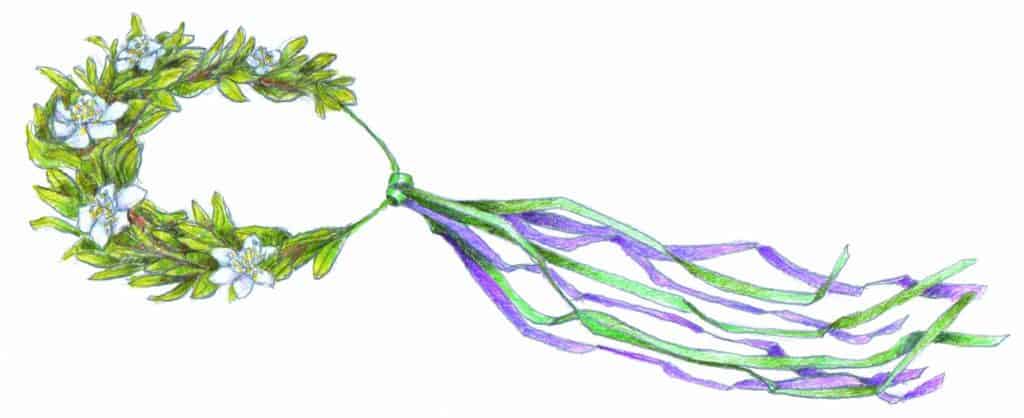
Closing Prayer:
O Lord, I praise You for the increasing ways of faith in You: Life with You is meant to be shared. I know this from Your Word and I know this from my garden! The beauty to behold, the seeds in multitude, the cuttings and divided perennials to pass on to others…I simply cannot keep this all to myself. Bless me to move from garden-giving to faith-proclaiming across all my activities and to propagate the faith as Holy Spirit guides me. Let me agree with Ruth: Your people will be my people and your God will be my God (Ruth 1:16). Keep filling me with love for Your people. Let the earth that You created be filled with Your love, pouring out of the hearts of all of us who love You. I am seeing eternity…may I seed eternity! I praise You for this mysterious delight. In Jesus’ Name, Amen.
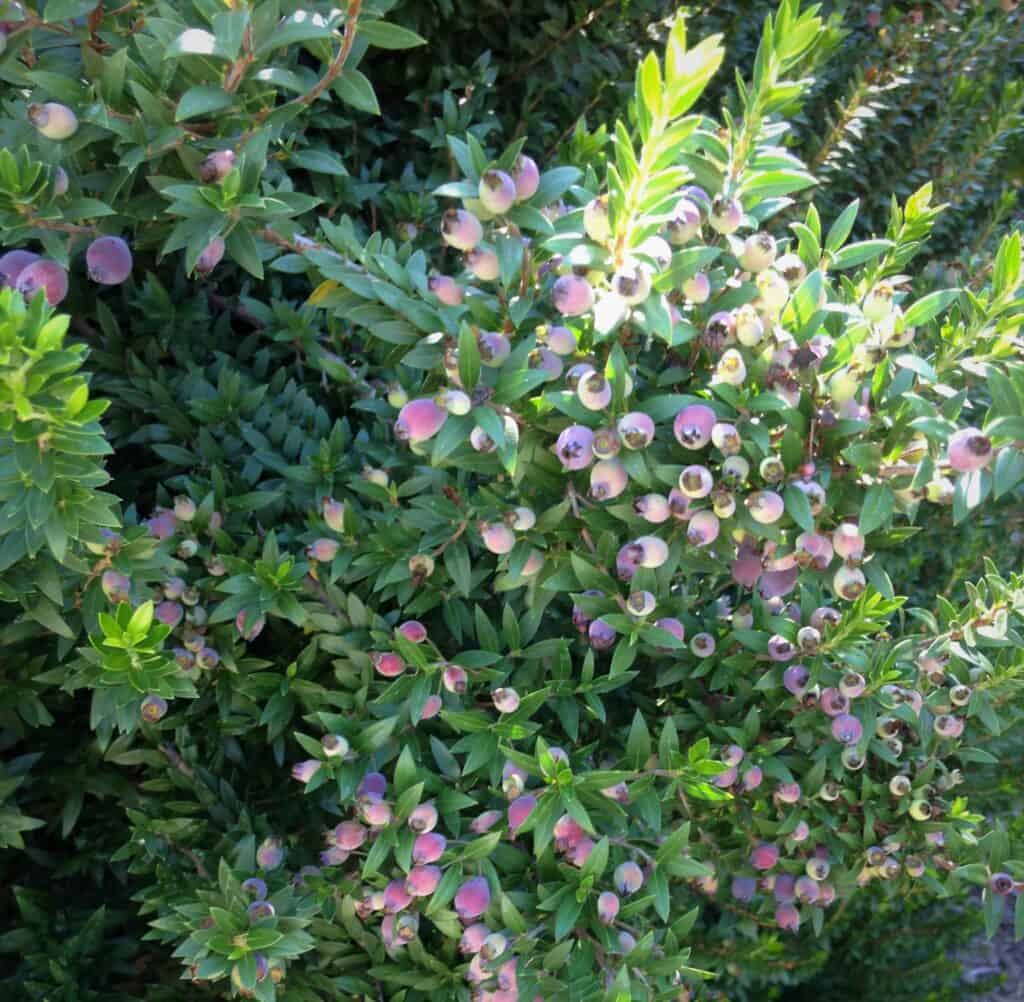
He will always show me love by his gracious and constant care. Psalm 57:3 TPT

A Gardener’s Promise explores God’s forever-with-you devotion to us. More than a casual sentiment, God’s love is an enriching commitment to dig into everything together, a promise to hang your hat on. Part journal questions, part planting guide, this 7-part series has been created as a companion to My Father is the Gardener, Devotions in Botany and Gardening of the Bible, a way to work out God’s profound assurance in the backyard, arriving at Resurrection Day with a deeper grasp of what Christ has for us in revival life.
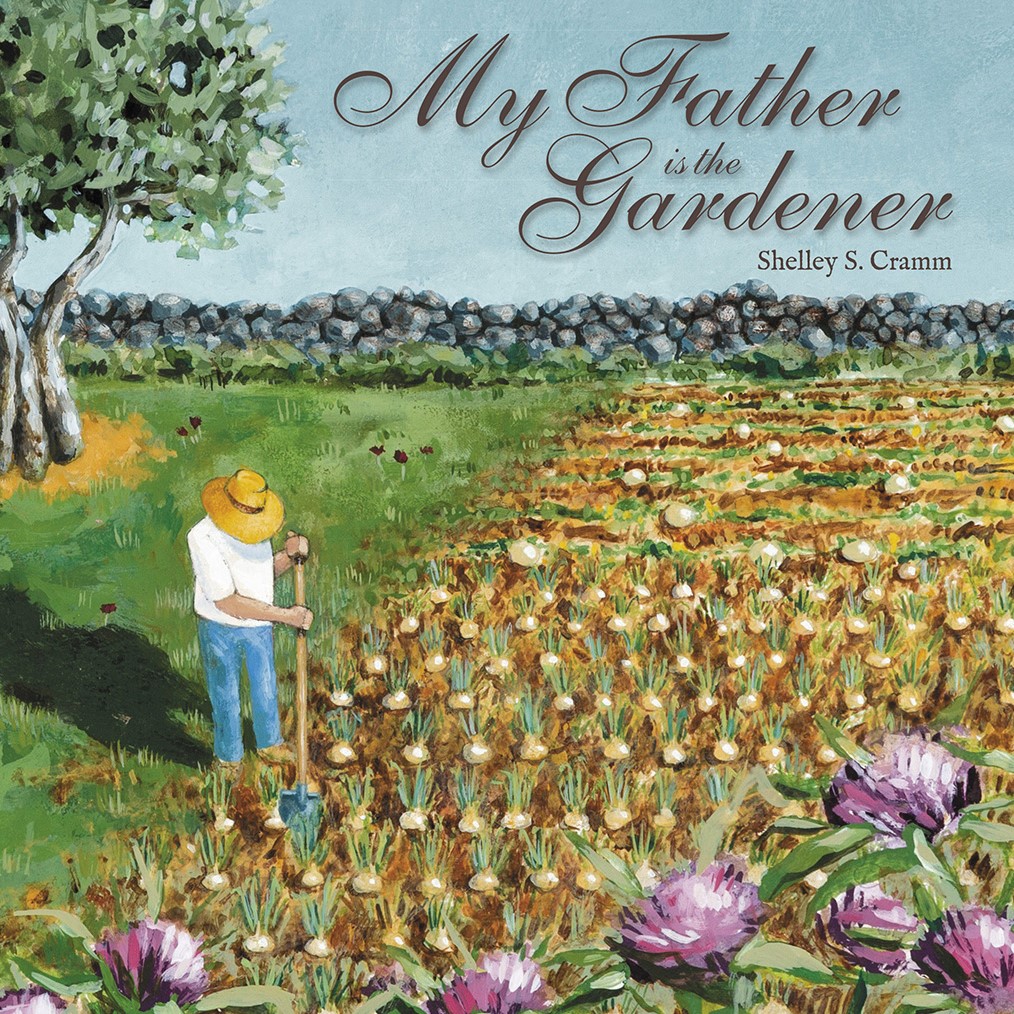
Enjoy Shelley’s latest book, a perfect study for Lent and the herald of spring. My Father is the Gardener digs into the plants, gardening, and landscapes of the Bible, unearthing inspiration in the routine ways of caring for plants and keeping a garden. Now available at BRIT Press, Powell’s Bookstore, and Amazon. Click to order: www.gardenindelight.com/books/my-father-is-the-gardener/
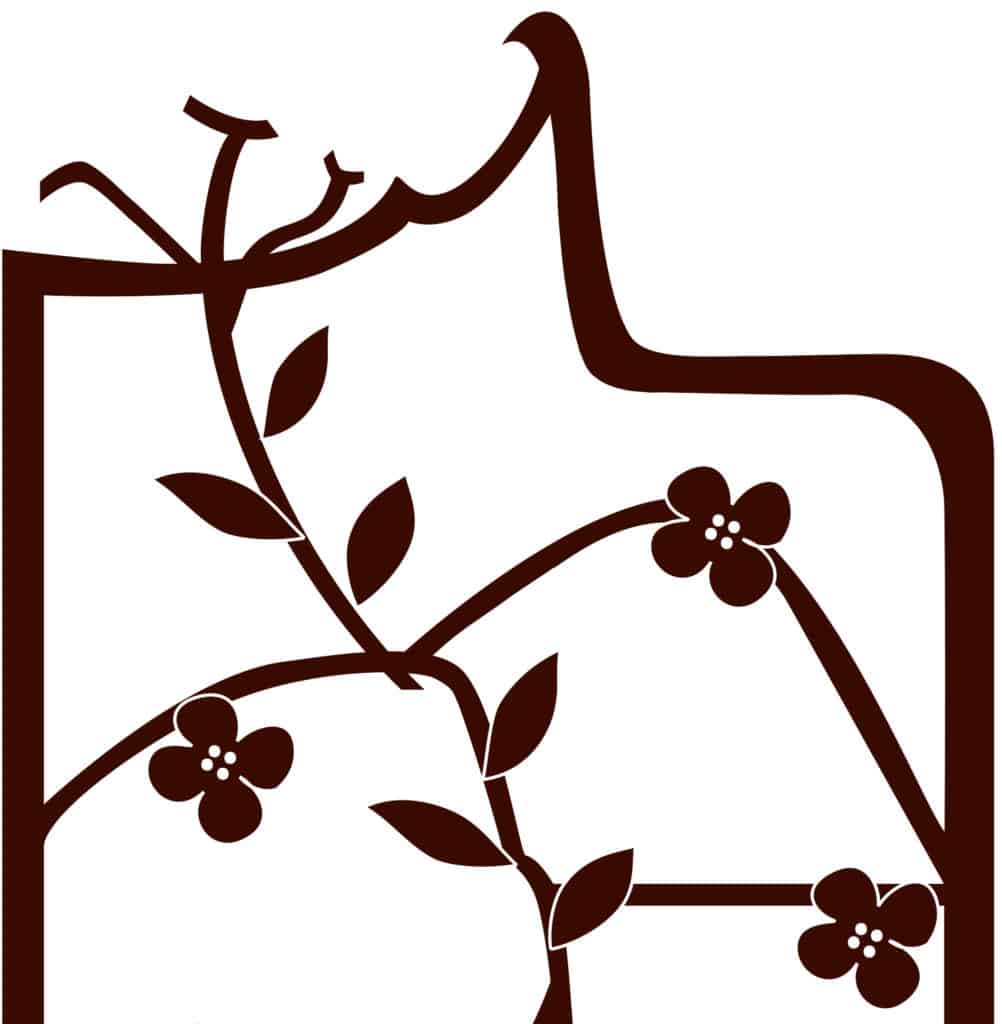
Visit the Plant Guide for more information on growing the plants of the Bible in your own garden. Find Flax in Edible Annuals and find Myrtle in Edible Shrubs & Vines
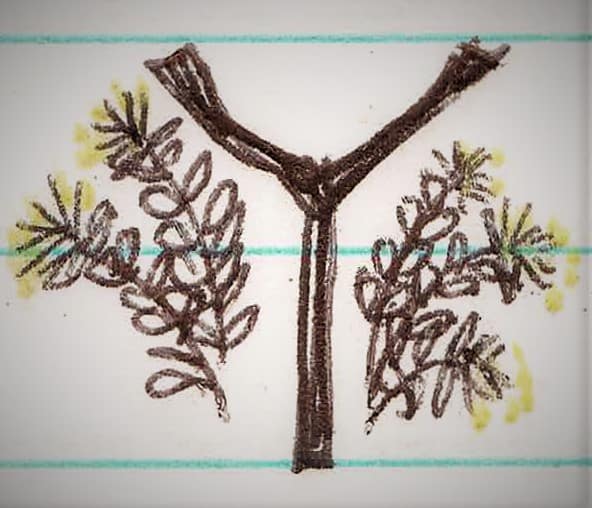
Have a little fun getting to know mYrtle in rhyme and meter! A-to-Z Primer of Plants from God’s Word, “Let’s celebrate Y with mYrtle”
Photo Credits: ©2022 Shelley S. Cramm flax flowers in our home garden, a meadow-like look for the spring; Gardener’s Hat by Layla Luna; ©2022 Shelley S. Cramm flax flowers detail; ©2018 Myrtle shrub at the San Antonio Botanical Garden, so leafy!!; Flax flower stalk from Stephenson, John. Medical Botany: or Illustrations and Descriptions of the Medicinal Plants … Vol. 2. (London: Printed for J. Churchill, 1831). Plate 61. Image from the Botanical Research Institute of Texas Library; Seedlings line up by Layla Luna; Myrtle flowering branch from Thome, Otto Wilhelm. Flora von Deutschland. (Gera-Untermhaus: Verlag von Fr. Eugen Kohler, 1886). Plate 96. Image from the Botanical Research Institute of Texas Library; (layered branch) Reveil, LeRegne. Vegetal; … Atlas Iconographique (Paris: L. Guerin, 1872). Plate 53. Image from the Biodiversity Heritage Library. Contributed by New York Botanical Garden, LuEsther T. Mertz Library. www.biodiversitylibrary.org/pageimage/12021998; Myrtle sprigs as a crown by Layla Luna.; ©2015 Shelley S. Cramm dwarf myrtle fruits detail from L.A. Arboretum. All drawings by Layla Luna created exclusively for My Father is the Gardener are copyrighted material. For copyright permission, please contact Shelley S. Cramm, shelleycramm@gardeninDelight.com
HCSB denotes Scripture quotations taken from the Holman Christian Standard Bible®, Copyright © 1999, 2000, 2002, 2003, 2009 by Holman Bible Publishers. Used by permission. Holman Christian Standard Bible®, Holman CSB®, and HCSB® are federally registered trademarks of Holman Bible Publishers.
ISV denotes Scripture quotations from The Holy Bible: International Standard Version. Release 2.0, Build 2015.02.09. Copyright © 1995-2014 by ISV Foundation. ALL RIGHTS RESERVED INTERNATIONALLY. Used by permission of Davidson Press, LLC.
The Message denotes Scripture quotations taken from THE MESSAGE, copyright © 1993, 2002, 2018 by Eugene H. Peterson. Used by permission of NavPress. All rights reserved. Represented by Tyndale House Publishers, a Division of Tyndale House Ministries.
NIV denotes Scripture quotations taken from the Holy Bible, New International Version®, NIV®. Copyright © 1973, 1978, 1984, 2011 by Biblica, Inc.® Used by permission of Zondervan. All rights reserved worldwide. www.zondervan.com The “NIV” and “New International Version” are trademarks registered in the United States Patent and Trademark Office by Biblica, Inc.®
NRSV denotes Scripture quotations taken from the New Revised Standard Version Bible, copyright © 1989 the Division of Christian Education of the National Council of the Churches of Christ in the United States of America. Used by permission. All rights reserved.
TPT denotes Scripture quotations taken from The Passion Translation®. Copyright © 2017, 2018, 2020 by Passion & Fire Ministries, Inc. Used by permission. All rights reserved. ThePassionTranslation.com
VOICE denotes Scripture quotations taken from The Voice™. Copyright © 2012 by Ecclesia Bible Society. Used by permission. All rights reserved

